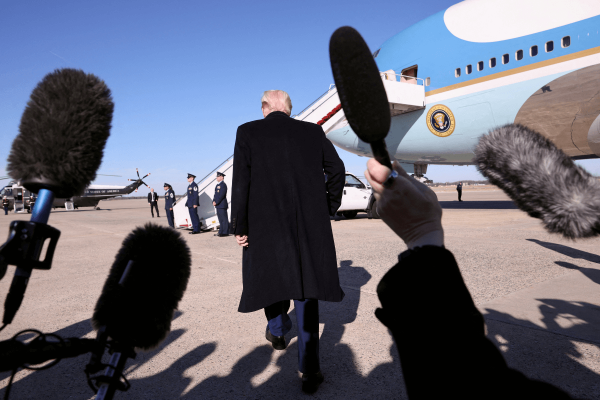Autocracies begin at the ballot box. Donald Trump is the legitimately elected president of the United States who, in his first weeks in office, has used illegitimate and illegal actions to solidify his power. He has brazenly declared, “He who saves his country does not violate any Law.”
But while he is the first U.S. president to display such public contempt for the structures, institutions, and civil servants he has been elected to lead, his tactics aren’t unique. They’re right in line with other elected autocratic leaders, including Prime Minister Viktor Orbán in Hungary, President Erdogan in Turkey, and Prime Minister Narendra Modi in India.
Today, for the first time in many decades, there are more autocracies in the world than democracies. However, the success of authoritarian leaders isn’t inevitable — in the U.S. or elsewhere. Autocrats have a playbook of predictable steps, but there are also proven ways to intervene.
Here’s the pattern autocratic politicians follow: They rise in popularity by exploiting economic insecurities and manipulating a people’s fear of others — immigrants, Kurds, Muslims, Jews, or any vulnerable public scapegoat. They employ extreme nationalistic sentiments, often bolstered by a religious ideology, to provide their followers with a sense of tribal righteousness. According to the nonpartisan organization Protect Democracy, once authoritarian leaders are elected, they employ the following tactics:
- Spread disinformation to create a supportive narrative for themselves.
- Exert political control over independent government agencies responsible for functions such as law enforcement, the court system, financial accountability, and intelligence.
- Intimidate and repress opposition voices, including in the media, civil society, and religious groups.
- Aggressively expand executive power over legislative power, judicial restraints, and legal precedents.
- Continue to scapegoat vulnerable groups and undermine the rights of minorities.
- Attack the integrity of elections and politicize those who administer them.
- Tolerate, condone, or stoke violence to bolster public support for authoritarian action.
These tactics flow from and enhance an autocrat’s own grandiosity. These movements portray trust in a charismatic “strong man” as the only remedy to the demographic fears, cultural estrangement, and economic anxieties felt by the plurality of supporters who have elected the leader.
Yet as autocrats try to hold on to their power, they rely on ordinary people. Such a leader needs the ongoing loyalty of those who felt politically and culturally disenfranchised and brought him to power. In Trump’s case, he won the loyalty of numerous grassroots groups including religious bodies, veterans, some labor groups, business associations, farmers, and many more. But as Trump’s illegal excesses of power accelerate, doubt and alarm may grow. In these early days, we can foster dialogue within all those civic, nongovernmental groups and associations. We can help create space for expressions of disappointment and disillusionment to grow. And as the contradictions and extremism of a leader like Trump become evident, grassroots groups may withdraw their support.
Bear in mind that Trump’s actions thus far are doing almost nothing to address the concrete economic struggles of the working people who voted for him in vast numbers. Their anxieties over health-care costs, for their children’s education, for job security, for medical leave, for home ownership, and more, are being ignored in the manic flurry of Trump’s executive orders. They will see a tax bill that shovels more millions to the educated upper class while billionaires are granted power to run the government. Working class folks don’t care about Greenland and the name of the Gulf of Mexico. They thought Trump would give them some economic relief and hope.
Trump uses his popularity with his base to threaten political retaliation against any elected Republican who dares to oppose any of his actions. But if only a half dozen GOP members of Congress would remember that God gave them a spine, they could stop some of the president’s expansive and illegal moves threatening constitutional rule. That’s why it’s so essential that constituents pressure their legislative representatives, in nonpartisan ways, expressing their rejection of Trump’s autocratic actions and plea for Congress to assume its constitutional power.
Legal actions through the courts are essential initiatives as well. The lawsuits already filed — more than 70 at last count — will take time, and results will be mixed. But they shed light on Trump’s unconstitutional overreach, throw sand in the gears of a grinding autocratic machine, and offer protection to the most vulnerable victims of Trump’s initiatives. Of particular interest to faith organizations is the lawsuit recently filed by 27 religious groups to prevent immigration agents from making raids in houses of worship, a practice that agents previously avoided until the Trump administration changed the rules. Already, this case has focused attention to the vulnerability many immigrants are feeling in their public religious participation. This legal initiative began in a conversation between two elders in a Presbyterian church.
In all these efforts, I believe the Christian community can add a faithful and effective public witness to Trump’s rising autocracy.
If all this seems implausible, we need to expand our political imagination and broaden our historical memory: Diverse, grassroots, nonviolent movements — often with the support of religious groups — have overturned autocratic regimes and changed history. In East Germany, gatherings in churches that became mass candlelit marches were essential in the process that overthrew their Communist regime and broke down the Berlin Wall. Religious groups and the courageous support of Cardinal Jaime Sin helped bring hundreds of thousands into the streets to overthrow the dictatorship of President Marcos in the Philippines. Through the nonviolent Women of Liberia Mass Action for Peace, thousands of Christian and Muslim women banded together in persistent protests to end a brutal civil war in Liberia and later assisted Ellen Johnson Sirleaf being elected as their first female head of state. And in the U.S., Black churches helped foster the nonviolent civil rights marches and sit-ins that eventually resulted in important legislative accomplishments. Morally rooted and religiously inspired grassroots actions can matter more than we imagine.
Trump’s first 100 days will end a few days after Holy Week. As Palm Sunday arrives, we as Christians should tell the whole story. Two processions entered Jerusalem at that time. Jesus, riding humbly on a donkey, with crowds giving praise and crying, “Save us!” But on the opposite side of the city, Pilate, representing the power of the Roman Empire, was entering, with a cohort of soldiers, displaying his might and grandeur, ready to crush any resistance during Passover. The vision of God’s kingdom, revealed in the life and ministry of Jesus, stood in stark contrast to the picture of an earthly, autocratic kingdom imposed by the grandiose power of Caesar. The question then is before the church today. Which procession are you joining?
That conflict, which is at the heart of Holy Week, culminates when the crowd responds to Pilate’s question about what to do with Jesus saying, “We have no king but Caesar!” It’s the issue of sovereignty. Who is our Lord? The growing autocracy of Donald Trump should be confronted by a faithful church at many levels, with grassroots resistance, legal challenges, protection of the vulnerable, and witnessing to truth. But at the heart of it all, we must ask together, in our preaching, our prayer, and our witness, and same question posed by Dietrich Bonhoeffer in his time: “Who is Jesus Christ for us today?”
Got something to say about what you're reading? We value your feedback!






